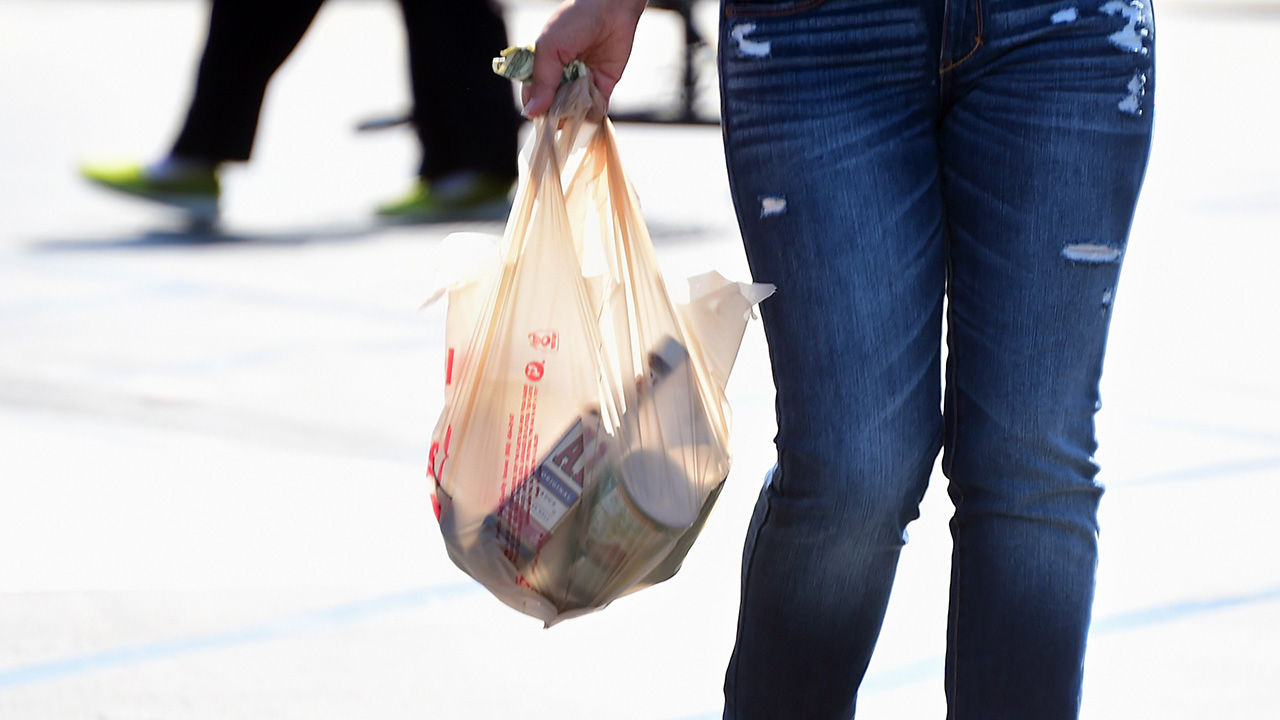California legislators are moving ahead with plans to ban all plastic bags—including reusable ones—in an ongoing effort to fight oil companies and cut down on plastic waste.
The state’s voters approved the first plastic bag ban in 2016 by passing Proposition 67, banning single-use bags at grocery stores, convenience stores, and other retailers.
The law, however, continued to allow stores to hand out thicker reusable plastic bags, which lawmakers say contribute to pollution. The bags are also made of fossil fuels, including petroleum, which state Democrats want to eliminate as part of their fast-tracked climate agenda.
To close this loophole, legislators seek to pass identical bills, Assembly Bill 2236 and Senate Bill 1053, prohibiting the use of all plastic bags. The measures passed their original chambers this month and now face approvals in the opposite chambers of the Legislature.
“Plastics are the next front in our fight against Big Oil,” Assemblywoman Rebecca Bauer-Kahan, who authored AB 2236, said. “By 2050, plastic production will exceed 20 [percent] of global oil production.”
The bill is a “critical step to eliminate plastic pollution, and eliminates an opportunity for the oil industry to continue destroying our planet,” she added in a statement on May 21.
State Sen. Catherine Blakespear partnered with state Sen. Ben Allen and Ms. Bauer-Kahan to push the identical bill in the Senate.
“California’s original ban on plastic bags hasn’t worked out as planned, and sadly, the state’s plastic bag waste has increased dramatically since it went into effect,” Ms. Blakespear said in a statement May 21.
Most of the thicker reusable plastic bags end up in landfills, she said.
The original 2016 bag ban required stores to accept plastic bags back for recycling, but that requirement ended in 2020.
Since then, the plastic bags that are recycled end up in Asia, where much of the plastic recycling in the United States ends up. This adds to global pollution, according to a legislative analysis of AB 2236.
The proposed legislation would continue requiring stores to collect 10 cents for every recycled paper bag given to customers. Stores would be able to sell or distribute other cloth, woven textile, or other washable textile bags to customers.
California’s recycling habits haven’t kept up with state goals, according to a report published in February by CalRecycle, a state department that oversees waste and recycling.
According to CalRecycle’s estimates using 2022 data, the latest available, Californians recycle only about 41 percent of waste, up from 40 percent in 2021. The statewide goal is to reach 75 percent.
Of the 31 million tons recycled, California sends about one-third of it—or about 11.3 million tons—overseas to be processed, a decrease of about 1 million tons from 2021, CalRecycle reported.
The state also sends scrap plastics to Mexico and Canada, mostly by truck and rail.
Plastic pollution and microplastics affect human health, according to the lawmakers behind the legislation.
Carl DeMaio of Reform California, a statewide grassroots organization fighting the high cost of living, said the newest plastic bag ban proposals might have unintended consequences.
“This is going to lead to many stores just getting rid of bags altogether,” Mr. DeMaio said in a May 23 post on social media platform X. “I think recycling is a good idea, but government mandates actually just cause more inconvenience, less quality of life, and higher costs. And that’s what I think is going to happen here.”
The American Recyclable Plastic Bag Alliance opposes the Assembly bill, saying current law requires the thicker bags to contain 40 percent recycled materials. These bags divert 183 million pounds of plastic from landfills, according to the alliance.
Passing the bill would likely trigger increased plastic use through the implementation of plastic woven bags, the alliance asserts. A similar plastic bag ban in New Jersey is blamed for tripling plastic consumption in the state as more plastic woven bags were used.
“As structured, AB 2236 will not reduce plastic use but merely substitute one form of plastic for another,” the alliance wrote in a statement of opposition to the bill.
If passed and signed by Gov. Gavin Newsom this year, the new plastic bag ban would go into effect on Jan. 1, 2026.














